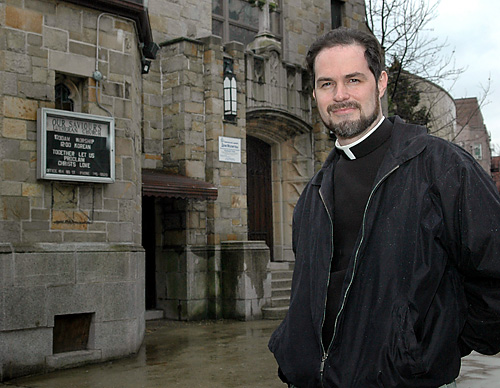Is the physical structure of a church sacred ground that should be preserved at all costs? Or is it merely mortar and stone that has nothing to do with its congregation’s larger mission?
More and more Bay Ridgites, both religious and secular, are asking that question anew, amid reports that two old churches within a few blocks of each other will soon be facing the wrecking ball.
The question “What is a church” came up during the discussion over the fate of Bay Ridge United Methodist, also known as the “Green Church,” on Fourth and Ovington avenues. The 100-year-old structure is slated to be sold and then torn down for condos.
Many residents of the area pleaded with the church to save the building, but Rev. Craig Miller of Our Saviors Lutheran jumped into the fray to explain what a “church” really is.
“A church isn’t just static brick and mortar, it is dynamic — and sometimes the external must be shed like the skin of a snake, so that the body can survive through adapting to the changing times,” said Miller, whose own building, on Fourth Avenue near 80th Street, may also soon be torn down.
Many residents disagree — believing that the physical presence of the church also carries important historical and religious connotations.
“I think tearing down Our Saviors is pure sacrilege,” said Maryanne Gouras, who sent her children to the church’s preschool. “It used to be that a church was considered sacred ground and that no one would think for one minute of tearing it down.”
Gouras isn’t alone in her anger over the coming condos being built over the ruins of century-old churches. A group of residents, led by Councilman Vince Gentile (D–Bay Ridge), tried to save the Green Church, but the church leaders persisted in their desire to sell — to the detriment of the entire community, according to one Brooklyn historian.
“If they take the attitude that these are just old buildings that don’t matter then we aren’t going to have anything left to show our children of our past,” said Robert Buonvino, president of Friends of Historic New Utrecht, which works hard to maintain the 300-year-old Dutch reformed church at 18th Avenue and 83rd Street.
But Buonvino’s passion misses the point, Miller said.
“At no time in all of the Bible does Christ give to the church a command to build structures and preserve them for all of time,” said Rev. Miller.
“We are currently spending 50 percent of our resources on maintaining the structure, and we would like to have that number around 15 percent.”
Both Buonvino and Miller did agree on one thing: if churches are to be saved, the community — not just parishioners — has to get involved.
“The responsibility of keeping our historic structures standing ultimately rests in the hands of the community,” Buonvino said.
The reverend agreed: “Truth is, there just aren’t as many people in the pews, and that means less income,” Rev. Miller said. “All of Brooklyn should begin to get used to the idea of saying goodbye to a lot of these old churches.”






















